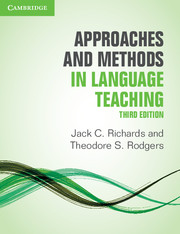Book contents
- Frontmatter
- Contents
- Acknowledgments
- Introduction to the third edition
- I Major trends in twentieth-century language teaching
- II Current approaches and methods
- III Alternative twentieth-century approaches and methods
- IV The teaching and learning environment
- Appendix: Comparison of approaches and methods
- Author index
- Subject index
9 - Task-Based Language Teaching
Published online by Cambridge University Press: 08 April 2022
- Frontmatter
- Contents
- Acknowledgments
- Introduction to the third edition
- I Major trends in twentieth-century language teaching
- II Current approaches and methods
- III Alternative twentieth-century approaches and methods
- IV The teaching and learning environment
- Appendix: Comparison of approaches and methods
- Author index
- Subject index
Summary
Introduction
Task-Based Language Teaching (TBLT) refers to the use of tasks as the core unit of planning and instruction in language teaching. It has been defined as “an approach to language edu-cation in which students are given functional tasks that invite them to focus primarily on meaning exchange and to use language for real-world, non-linguistic purposes” (Van den Branden 2006). Some of its proponents (e.g., Willis 1996; Willis and Willis 2007) present it as a logical development of Communicative Language Teaching (Chapter 5) since it draws on several principles that formed part of the CLT movement from the 1980s. For example:
• Activities that involve real communication are essential for language learning.
• Activities in which language is used for carrying out meaningful tasks promote learning.
• Language that is meaningful to the learner supports the learning process.
TBLT is usually characterized as an approach, rather than a method. According to Leaver and Willis (2004: 3), “TBI [task-based instruction] is not monolithic; it does not consti-tute one single methodology. It is a multifaced approach, which can be used creatively with different syllabus types and for different purposes.” Thus, it can be linked with other approaches and methods, such as content-based and text-based teaching (Leaver and Willis 2004). Proponents of TBLT contrast it with earlier grammar-focused approaches to teach-ing, such as Audiolingualism, that they characterize as “teacher-dominated, form-oriented classroom practice” (Van den Branden 2006).
A key distinction can be made between curricula/syllabuses that formulate lower-level goals in terms of linguistic content (i.e. elements of the linguistic system to be acquired) and curricula/syllabuses that formulate lower-level goals in terms of language use (i.e. the specific kinds of things that people will be able to do with the target language). Task-based curricula/syllabuses belong to the second category: they formulate operational language learning goals not so much in terms of which particular words or grammar rules the learners will need to acquire, but rather in terms of the purposes for which people are learning a language, i.e. the tasks that earners will need to be able to perform.
(Van den Branden 2006: 3)Information
- Type
- Chapter
- Information
- Approaches and Methods in Language Teaching , pp. 174 - 199Publisher: Cambridge University PressPrint publication year: 2014
